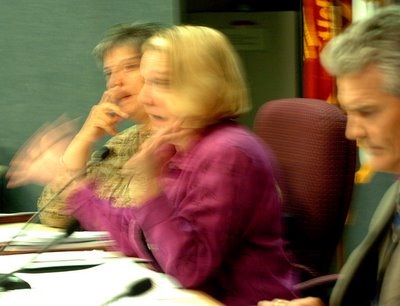
Nothing. I chose to photograph City Councillor Sally Mayer at a slow shutter speed to demonstrate her arm waving when she becomes passionate about almost any issue.
Mayer is under attack! Attorney Dawn Penni Adrian is leading a petition effort to recall the councillor.
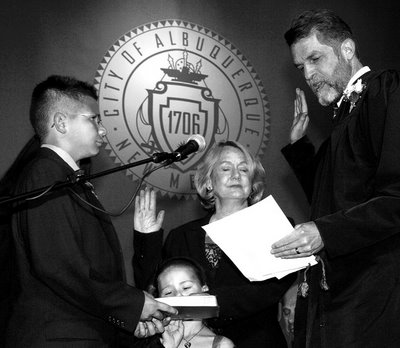
Mayer is a second-term councillor re-elected by defeating three opponents, Marianne Dickinson, Wayne A. Johnson and Edward Douglas Glenn, last November.
She is a realtor and staunch supporter of what is seen by some as unrestrained growth.
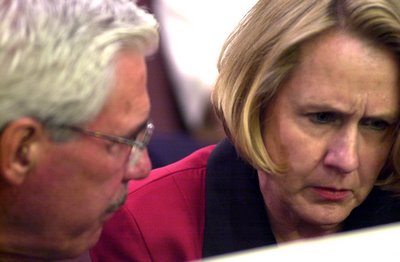 Here she is with Public Works Department Director Charles "Ted" Asbury looking at a West Side map talking about the unauthorized paving of Universe Blvd. N.W. during public comments.
Here she is with Public Works Department Director Charles "Ted" Asbury looking at a West Side map talking about the unauthorized paving of Universe Blvd. N.W. during public comments.
It is my opinion that in the 32-year history of the Albuquerque city council she is the second worst councillor to serve.
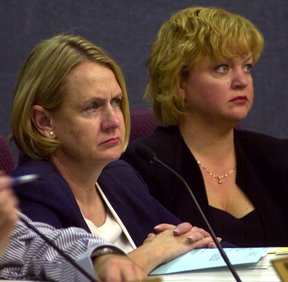
She only exceeds Tina Cummins, seen here on the right, who is also a realtor. Cummins was elected when long-sitting incumbent Councillor Michael Brasher failed to file his candidacy paperwork on time and was defeated as a write-in. Brasher bounced back and was elected to the county commission.
Cummins still out did Mayer. Not only did Cummins never seem to have an idea, she was the quietest councillor. The only topics that you could count on to get her to speak were on real estate development, the anti-smoking ban and adjournment of meetings. She and Mayer pushed to impose a 10:30 pm cut-off time for council meetings regardless of how much of the agenda was remaining.
Tina Cummins came closer to accomplishing a goal her brother, former Councillor Tim Cummins had, “to never be quoted in the newspapers.”
 Cummins’ family shows their support at her first council meeting in December 2001. Former Councillor and current County Commissioner Tim Cummins, left, takes a snooze as he occasionally did while he sat on the dais.
Cummins’ family shows their support at her first council meeting in December 2001. Former Councillor and current County Commissioner Tim Cummins, left, takes a snooze as he occasionally did while he sat on the dais.Tim Cummins ranks third on my list of worst councillors. He introduced only one bill that was truly his own; to authorize golf carts to transport coolers allowing drinking on public golf courses. It took an awful lot of effort to convince him that the state’s Driving While Intoxicated law applied to golf carts just like it did any other vehicle and the law’s application of “anywhere in the state” included golf courses. He abandoned the bill.
The Cummins’ political philosophy seems predicated on not forwarding an agenda for their constituency.
 Mayer’s Record
Mayer’s RecordAccording to city council records, Mayer has her name on 82 pieces of legislation in the four and a half years she has served. She had 30 ordinances, 41 resolutions, eight rules amendments, two executive communications and one memorial.
Of those, 16 were separate issues directly related to animals, which is about 20 percent of all her activity. Twelve items failed, three died on expiration of the council’s term, two are in committee and one is pending final action after being postponed 13 times. That is an additional 22 percent. Add these to the eight rules amendments, two executive communications and one memorial for an additional 13 percent. Which left 45 percent of legislative actions that Mayer has sponsored successfully.
The other thing to put into the mix is pieces of legislation carried for the administration. The mayor’s administration may only submit the budget. A councillor must introduce any other proposed legislation the administration wants passed. All councillors are asked to carry such bureaucratic bills such as property condemnations, road limitations, changes within their districts and to carry requests for grants.
There are good political reasons for this. It allows councillors to build a record of anti-crime initiatives, housing support or care for the elderly through requests for state and federal grants. Mayer has carried her share; 11 state and federal grants, 10 “by request” of the administration, two road limitations and two condemnations.
In the same period of time, fellow Councillor Michael Cadigan has 154 pieces of legislation. Even Tina Cummins, who left the council six-months ago, had 106 pieces of legislation with her name on them.
Councillor Martin Heinrich out does his colleagues. According to Albuquerque Journal’s Dan McKay’s February 14, 2005 article, “Councilor Defies Labels While Pushing Agenda,” “…Heinrich introduced the most bills last year - 39." The city councils’ online records show that he has more than 200 pieces of legislation with his name on them in only two and a half years.
In Mayer’s first campaign, “A Brighter Tomorrow” she promised; safer neighborhoods, more police officers, improving city streets, providing more after school programs and ending the political bickering.
No piece of legislation of hers addresses safer neighborhoods, increasing the number of police officers or anything about after school programs.
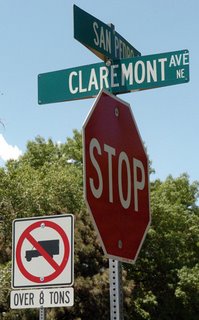 Her one campaign success was posting several signs on one street. The legislation imposed a restrictive weight limit on San Pedro where it runs through a residential area. It was passed in March of her fourth year of her first term.
Her one campaign success was posting several signs on one street. The legislation imposed a restrictive weight limit on San Pedro where it runs through a residential area. It was passed in March of her fourth year of her first term. As for ending the political bickering, if anything, she poured fuel on the fire.
She openly maligns fellow councillors who take a differing position than she holds, sometimes into an open microphone. She attacks the person rather than the issue.
She was characterized as “Albuquerque City Council's notoriously giggly sorority-girl, Sally Mayer…” by quirkyburque.com.
She resembles a cheerleader who remains not only hopeful but also overly enthusiastic in the face of a crushing defeat. When a male councilor was sandwiched between herself and Tina Cummins on the council dais, the women were referred to by fellow Republican operatives as the “blond bookends” in a disparaging stereotypical remark on the intelligence of light haired women.
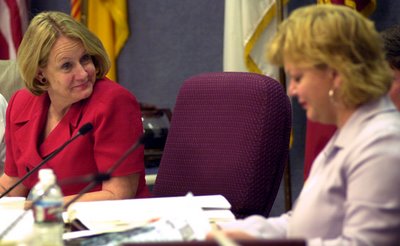
Mayer comes off as smug, snide, spiteful and often displays an air of self-satisfaction when she thinks she has scored, against another councillor, or citizen, with a differing view-point in what appears to be a game of verbal tag.
 This series of pictures demonstrate the faces she makes to other councillors or public commentators.
This series of pictures demonstrate the faces she makes to other councillors or public commentators.During her closing summation on the rewrite of the animal control ordinance, she talked about how the bill not only served animals, but humans also. She then said, when speaking of humans, she wanted to talk about her grandchild. She admonished her fellow councillors that she had plans to visit the child and did not want any emergency meeting to come up during the regularly dormant month of July. Last year, an issue related to fire danger prompted an emergency meeting that threatened her schedule.
On occasion Mayer leaves the dais, during on-going council discussions, to meet at the rear of the chambers and talk with people, on what is clearly a personal level. She is seen here, left, receiving a personal card.
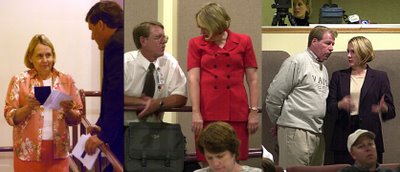
In her second year, she caused a political storm when she requested from then Director of Council Services Mark Sanchez the legislative history of fellow Councillor Brad Winter. She then gave the material to Winter’s opponent, whom she was supporting. There was a great deal of debate over the propriety of having council staffers retrieve material that were then used politically. The papers and other media blasted her. None seemed to recognize that what she did was make an informal “Inspection of Public Records Request.”
Mayer used her status as a councillor to go directly to the head bureaucrat, bypassing the formal process the public might be required to take. The fact that she used the material in a partisan way may be a demonstration of poor form by bringing the political fight into the office. It otherwise is no body’s business how the public record is used. There was an attempt to write a council rule prohibiting the use of council staff for political purposes. It is unenforceable in light of the state’s Inspection of Public Records Act.
Mayer holds what appears to be an anti-constitutional mindset ignoring the limitations and prohibitions on government.
In her first year as a councillor, she floated the idea of requiring citizens to use sunscreen after she discovered her own skin cancer. The idea never matured into a legislative proposal. On September 13, 2002, Tribune Reporter Kate Nash described, “Mayer, known as a low-key lawmaker who is consistently quiet at the council podium…” She has since become anything but low-key. She has now found her sea legs and is openly the roughest kid on the playground.
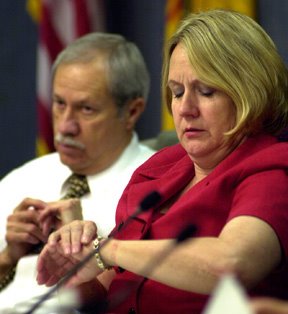 She proposed a rules amendment regarding public comments, moving them from the beginning of the meeting to the last agenda item. Her efforts to limit the length of council meetings had two potentially deleterious effects. It kept the public through the entire meeting. Opponents contended this was to discourage public participation. It would drive off all but the die-hards. There was a very good chance that the meeting could end at 10:30 without reaching the public comment portion of the agenda. The proposal failed.
She proposed a rules amendment regarding public comments, moving them from the beginning of the meeting to the last agenda item. Her efforts to limit the length of council meetings had two potentially deleterious effects. It kept the public through the entire meeting. Opponents contended this was to discourage public participation. It would drive off all but the die-hards. There was a very good chance that the meeting could end at 10:30 without reaching the public comment portion of the agenda. The proposal failed.Mayer successfully amended the Labor-Management Relation Ordinance by requiring future increased financial commitments to employees be supported in the budget. What this means is that if the city administration enters into a multi-year contract with an employees’ union, any subsequent pay raises could be voided by a new budget that is under-funded.
Mayer’s action is philosophically sound if not shortsighted. Legally, governmental budgeting requires available funding for ongoing expenses such as increased employee wages. Where she failed was in not requiring the administration to impose limitations on only entering into one-year contracts, thus prohibiting the possibility of the city defaulting on a valid contract.
Mayer successfully attacked the procedure used to select public art by the Arts Board. Her action reversed a valid decision because she disliked the piece of art by sculptor Tom Waldron. Her change in the procedure was the equivalent of an ex-post facto law.
Councillor Miguel Gómez’ attempted to abolish standing council committee meetings. Gómez had been a council staffer before being elected and thought that committees did not serve a worthwhile purpose and wasted time. The city charter requires the use of such committees.
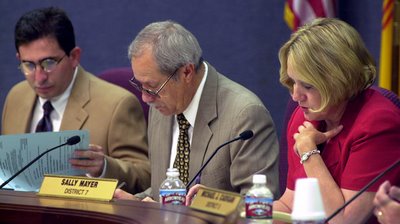 Gómez, seen here on the left, with Councillors Vince Griego and Mayer.
Gómez, seen here on the left, with Councillors Vince Griego and Mayer.Mayer supported Gómez’ efforts, in part, because the first action she had brought failed in committee and she could not get it revived in the full council. Her number one agenda item died an ugly death. She complained that because she was inexperienced, she was unable to traverse the procedural landscape of the legislative process.
Mayer successfully had a ballot initiative placed before voters requiring photo voter identification cards in all future city elections. This was based on a single complaint of voter fraud, of which she became aware. However, testimony revealed that most voter fraud happens with absentee ballots rather than at the polls.
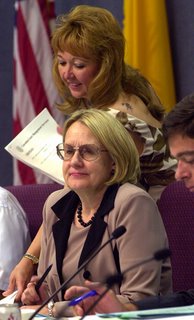 In her reelection campaign she put out a flyer, “The right to vote,” with the slogan, “Your vote is your voice.” She hoped her constituents would vote yes for the photo voter ID. On the reverse side she wrote, “Thank you! …for requesting an absentee ballot or deciding to vote ‘Early,’” which bypassed the use of photo IDs.
In her reelection campaign she put out a flyer, “The right to vote,” with the slogan, “Your vote is your voice.” She hoped her constituents would vote yes for the photo voter ID. On the reverse side she wrote, “Thank you! …for requesting an absentee ballot or deciding to vote ‘Early,’” which bypassed the use of photo IDs.The action is consistent with attempts to move towards a national identification card and an attack on civil liberties. Voters passed the measure.
Mayer has embraced the criminal nuisance abatement theories that abound at the moment. She has carried legislation, in the parlance of council bureaucracy, “providing an appropriation to the legal department to support the D.W.I. vehicle seizure program,” and “amending the motor vehicle seizure and forfeiture ordinance, to provide for recovery costs upon the forfeiture of motor vehicles operated by persons convicted of driving under the influence.”
In sponsoring a dangerous dog ordinance she created an administrative hearing officer and required a $50 fee to appeal. The same $50 fee was challenged in the photo red light and speed photo radar ordinance by the American Civil Liberties Union.
The city agreed with the ACLU that the fee was unconstitutional and the council rescinded it in the photo equipment ordinance. Neither the administration nor council has addressed removing the $50 appeal fee from any other ordinance with similar or exact language.
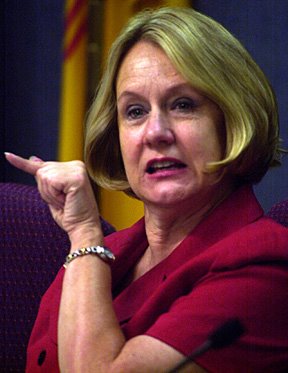
Mayer is currently carrying a piece of legislation for the administration to decriminalize 72 sections of the city code, removing them from the jurisdiction of the metropolitan court, making them a criminal nuisance or “civil matter” and creating an administrative hearing officer to adjudicate the issues.
The problem is that under the state constitution’s section on municipal home rule, the city is prohibited from creating its own judicial system. The state courts are the exclusive jurisdiction in the state for resolving issues with the citizenry over violations of city ordinances.
All traffic, criminal and civil violations of city ordinances are required to start in metropolitan court. Nuisance abatement is the exception. Instead of being heard in metropolitan court, the district court has exclusive jurisdiction.
Mayer attempted to amend the merit system ordinance by carrying legislation for the administration. When she was convinced it was unworkable, she then made “a do not pass” recommendation, which carried and killed the bill.
A group of citizens acquired the necessary signatures to place a minimum wage initiative on the ballot. It was discovered that a person paid to gather signatures had apparently used the phone book to pad her petition list.
One of the names used was former councillor, now County Commissioner Tim Cummins. He demanded Sheriff Darren White conduct a criminal investigation. The suspect was identified, indicted by the grand jury and fled to Michigan. An arrest warrant is still outstanding. The law against voter petition fraud worked.
Based on this one petition incident, Mayer has authored a bill. It prohibits payment to circulators based on a fee for each signature on a petition. It further requires the use of a particular form. She ignores the First Amendment prohibition on governments “…shall make no laws…” in the sections on "...the right of the people to peaceably assemble, and to petition government for a redress of grievances."
Monday night she again postponed her petition bill until the August 7 council meeting. Mayer said she did not think it might look appropriate because she is facing a recall petition herself.
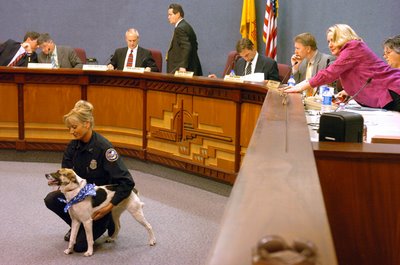
Mayer publicly embarrassed an animal control officer who was presenting one of her “pet project” dogs before the council by saying the dog was adorable and so was the handler. The officer was clearly chagrined and embarrassed. Mayer failed to recognize that she had just sexually harassed the woman on government cable access GOV-TV-16.
Mayer, along with Councillors Craig Loy and Ken Sanchez voted on Monday night against a bill reforming the ethics code.
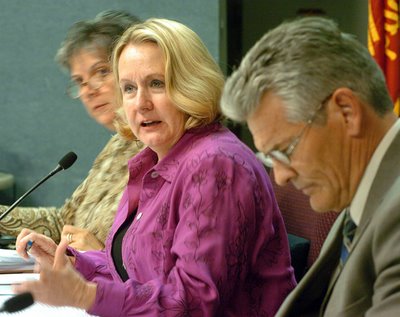 She argued against prohibiting the mayor or councillors from voting on issues involving people seeking to do business with the city. According to the bill. the mayor or councillors who accepted campaign contributions from donors, within the preceding year, would be limited in voting on those issues.
She argued against prohibiting the mayor or councillors from voting on issues involving people seeking to do business with the city. According to the bill. the mayor or councillors who accepted campaign contributions from donors, within the preceding year, would be limited in voting on those issues. The ethics bill introduced by Winter needed seven votes as a charter amendment to pass, but it died on a 6-3 vote.
I leave it to the voters of district seven to decide. Is Mayer's record what they voted for or do they wish to sign a petition calling for a special retention election.
2 comments:
Who can I contact to sign the recall petition
I do not know.
I attempted to contact Dawn Penni T. Adrian who announced the recall effort at penni@adrian-law.com but she did not respond.
In order to sign the petition you must be a registered voter in Albuquerque's council district seven.
You can call Albuquerque City Clerk Millie U. Santillanes at (505) 768-3030 and obtain the information on the petitioner who had to register with the clerk.
Post a Comment